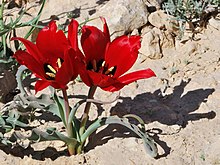| Tulipa systola | |
|---|---|
 | |
| Flowering in the Negev, Israel | |
| Scientific classification | |
| Kingdom: | Plantae |
| Clade: | Tracheophytes |
| Clade: | Angiosperms |
| Clade: | Monocots |
| Order: | Liliales |
| Family: | Liliaceae |
| Subfamily: | Lilioideae |
| Tribe: | Lilieae |
| Genus: | Tulipa |
| Species: | T. systola |
| Binomial name | |
| Tulipa systola | |
| Synonyms[2] | |
|
List
| |
Tulipa systola, the desert tulip, is a species of tulip native to the Middle East; Sinai, the Levant, Anatolia, Iraq and Iran.[2][3] A geophyte adapted to arid conditions, it can remain dormant or produce only leaves in bad years based on environmental cues.[4]
References
- ↑ Denkschr. Kaiserl. Akad. Wiss., Wien. Math.-Naturwiss. Kl. 50: 17 (1885)
- 1 2 "Tulipa systola Stapf". Plants of the World Online. Board of Trustees of the Royal Botanic Gardens, Kew. 2017. Retrieved 1 September 2020.
- ↑ "Tulipa systola (15)". The Royal Horticultural Society. Retrieved 1 September 2020.
- ↑ Boeken, B. (1991). "Above-Ground Emergence in the Desert Tulip Tulipa systola Otto Stapf (botanist)|Stapf In the Negev Desert of Israel". Functional Ecology. 5 (5): 705–712. doi:10.2307/2389491. JSTOR 2389491.
This article is issued from Wikipedia. The text is licensed under Creative Commons - Attribution - Sharealike. Additional terms may apply for the media files.